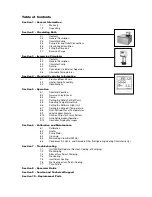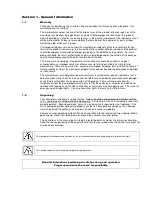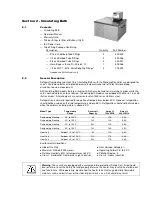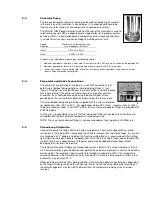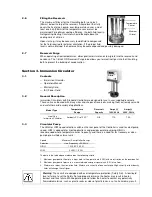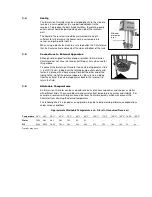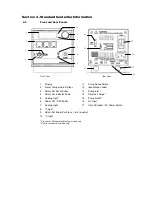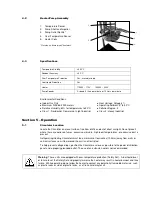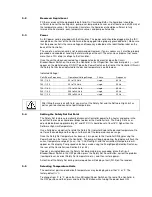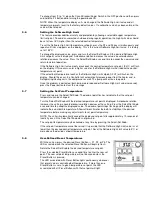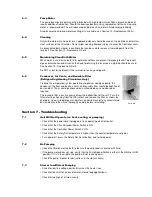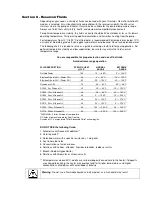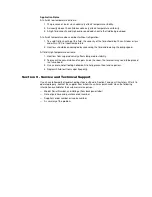
Section 8 - Reservoir Fluids
Depending on your needs, a variety of fluids can be used with your Circulator. No matter what bath
medium is selected, it must be chemically compatible with the reservoir and with the 300 series
stainless steel in the pump and heater. It must also be suitable for the desired temperature range.
Always use fluids that satisfy safety, health, and equipment compatibility requirements
For optimum temperature stability, the fluid’s viscosity should be 50 centistokes or less at its lowest
operating temperature. This permits good fluid circulation and minimizes heating from the pump.
For temperatures from 10°C to 90°C, distilled water is recommended. For temperatures below 10°C,
a mixture of laboratory grade ethylene glycol and water should be used. Do not use deionized water.
The following chart is intended to serve as a guide in selecting a bath fluid for your application. For
optimum temperature stability and low vaporization, be sure to stay within the fluid's normal
temperature range.
You are responsible for proper selection and use of the fluids.
Avoid extreme range operation
.
FLUID DESCRIPTION
SPECIFIC HEAT
NORMAL
EXTREME
@25°C
RANGE
RANGE
Distilled Water
1.00
10° — 90°C
2° — 100°C
Ethylene Glycol 30% / Water 70%
.90
0° — 95°C
-15° — 107°C
Ethylene Glycol 50% / Water 50%
.82
-20° — 100°C
-30° — 100°C
Dynalene-HC 50
.76
-50° — 60°C
-62° — 60°C
DC200, 5 cs Silicone Oil
.32
-35° — 65°C
-50° — 125°C*
DC200, 10 cs Silicone Oil
.34
-20° — 80°C
-35° — 165°C*
DC200, 20 cs Silicone Oil
.36
0° — 100°C
-10° — 230°C*
DC200, 50 cs Silicone Oil
.39
50° — 150°C
5° — 270°C*
DC510, 50 cs Silicone Oil
.39
50° — 150°C
5° — 270°C*
DC550, 125 cs Silicone Oil
.42
100° — 200°C
80° — 232°C*
DC710, 500 cs Silicone Oil
.45
150° — 250°C
125° — 260°C*
*WARNING - Fluid’s flash point temperature
DC fluids are manufactured by Dow Corning.
Dynalene HC is a registered TM of Advanced Fluid Technology Inc.
DO NOT USE the following fluids:
1. Automotive antifreeze with additives**
2. Hard tap water**
3. Deionized water with a specific resistance > 1 meg ohm
4. Any flammable fluids
5. Concentrations of acids or bases
6. Solutions with halides: chlorides, fluorides, bromides, iodides or sulfur
7. Bleach (Sodium Hypochlorite)
8. Solutions with chromates or chromium salts
** At temperatures above 40°C, additives or mineral deposits can adhere to the heater. If deposits
are allowed to build up, the heater may overheat and fail. Higher temperatures and higher
concentrations of additives will hasten deposit build up
Warning
: Do not use a flammable liquid as a bath medium as a fire hazard may result.

